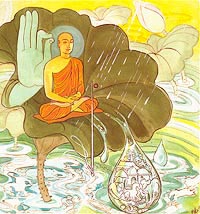29X12 Monday LESSON 736 திபிடக முக்கூடைகள் ![]() TIPITAKA from FREE ONLINE eNālāndā Research and Practice UNIVERSITY through http://sarvajan.ambedkar.org-Dhammapada Verse 401 Uppalavanna Theri
TIPITAKA from FREE ONLINE eNālāndā Research and Practice UNIVERSITY through http://sarvajan.ambedkar.org-Dhammapada Verse 401 Uppalavanna Theri
Vatthu-Him I call
a brahmana, who does not cling to sensual pleasures, just as water
does not cling to a lotus leaf, or the mustard seed to the tip of an
awl.
Verse 401. He Is A Brahmana Who Clings Not To Sensual Pleasures
Like water on a lotus leaf,
or mustard seed on needle point,
whoso clings not to sensual things,
that one I call a Brahmin True.
Explanation: The water does not get attached
to the surface of the lotus leaf. The mustard seed does not get attached
to the point of a needle. In the same way, the wise one’s mind does
not get attached to sensual pleasure. Such a non-attached person I describe
as the true brahmana .
Dhammapada Verse 401
Uppalavanna Theri
VatthuVari pokkharapatteva
araggeriva sasapo
yo na limpati kamesu
tamaham brumi brahmanam.
Verse 401: Him I call a brahmana, who does not
cling to sensual pleasures, just as water does not cling to a lotus leaf, or the
mustard seed to the tip of an awl.
The Story of Theri Uppalavanna*
While residing at the Jetavana
monastery, the Buddha uttered Verse (401) of this book, with reference to Theri
Uppalavanna.Once, some bhikkhus were talking
about the arahat Theri Uppalavanna being molested by the young Nanda who was
then swallowed up by the earth. In this connection, they asked the Buddha
whether arahats do not enjoy sensual pleasures as they have the same physical
make-up like any other people. To them the Buddha replied, “Bhikkhus!
Arahats do not enjoy sensual pleasures; they do not indulge in sensual
pleasures, for they do not cling to objects of sense and to sensual pleasures,
just as water does not cling to the lotus leaf or the mustard seed to the tip of
an awl.”Then the Buddha spoke in verse as
follows:
Verse 401: Him I call
a brahmana, who does not cling to sensual pleasures, just as water
does not cling to a lotus leaf, or the mustard seed to the tip of an
awl.* This story is the continuation of the story
given in Verse 69: The
Story of Theri Uppalavanna, Chapter V.
The Story of Theri Uppalavanna
While residing at the Jetavana monastery, the Buddha uttered Verse (69) of
this book, with reference to Theri Uppalavanna.
Once there was a young daughter of a rich man in Savatthi. Because she was so
beautiful, with looks so tender and sweet, like a blue lotus flower, she was
called “Uppalavanna”, the blue lotus. The fame of her beauty spread
far and wide and there were many suitors: princes, rich men and many others. But
she decided that it would be better for her to become a bhikkhuni, a
female member of the Buddhist Order. One day, after lighting a lamp, she kept
her mind fixed on the flame and meditating on the fire kasina (object of
concentration) she soon achieved Magga Insight and finally attained arahatship.
Some time later, she moved to the ‘Dark Forest’ (Andhavana) and lived in
solitude. While Theri Uppalavanna was out on her alms-round, Nanda, the son of
her uncle, came to her monastery and hid himself underneath her couch. Nanda had
fallen in love with Uppalavanna before she became a bhikkhuni; his intention
obviously was to take her by force. When Uppalavanna returned she saw Nanda and
said, “You fool! Do no harm, do not molest.” But he would not be
stopped. After satisfying himself, he left her. As soon as he stepped on the
ground, the earth opened wide and he was swallowed up.
Hearing about this, the Buddha spoke in verse as follows:
| Verse 69: As long as the evil deed does not bear fruit, the fool thinks it is sweet like honey; but when his evil deed does bear fruit, the fool suffers for it. |
At the end of the discourse, many attained Sotapatti Fruition.
The Buddha next sent for King Pasenadi of Kosala and told him about the
dangers that bhikkhunis living in forests had to face from irresponsible persons
obsessed with sex. The king then promised to build monasteries for bhikkhunis
only in towns or close to the towns.